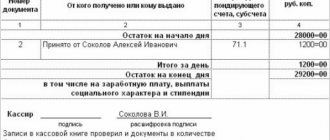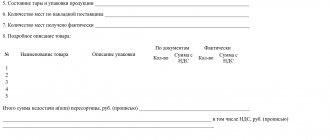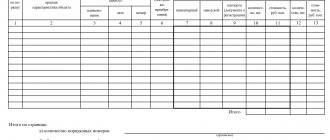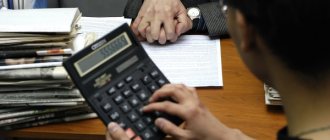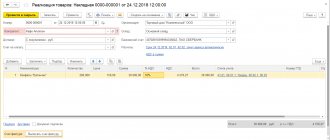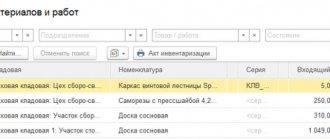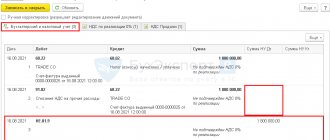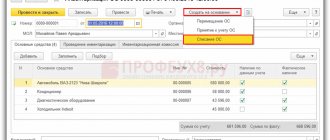Basic rules for deducting and recovering VAT
In terms of goods received by the VAT payer (as well as for other values), the Tax Code of the Russian Federation establishes the right to a tax deduction for this tax (clause 1 of Article 171). The deduction will not raise questions if the following conditions are simultaneously met in relation to the goods:
- subsequent transactions with it are supposed to be carried out with VAT (clauses 1, 2 of Article 171 of the Tax Code of the Russian Federation);
- goods are reflected in accounting (clause 1 of article 172 of the Tax Code of the Russian Federation);
- there is an invoice issued by the supplier (clause 1 of Article 169 of the Tax Code of the Russian Federation), or a document (customs declaration) confirming the fact of payment of tax upon import into the Russian Federation (clause 1 of Article 172 of the Tax Code of the Russian Federation).
The Tax Code of the Russian Federation obliges the restoration of a tax previously accepted for deduction in quite unambiguous situations (clause 3 of Article 170), including when the product with which the tax is associated:
- contributed to the management company or mutual fund (subclause 1, clause 3, article 170);
- is involved in operations not subject to VAT (subclause 2, clause 2, article 170);
- changes its value downward (subclause 4, clause 3, article 170);
- subsidized by the budget (subclause 6, clause 3, article 170).
For more information about which transactions are classified as non-VAT taxable, see the article “Transactions not subject to VAT taxation: types and features.”
Is it necessary to restore VAT when writing off a defect? Find out the answer to this question in the ConsultantPlus ready-made solution. If you don't have access yet, get a free trial online.
Conditions for writing off and restoring VAT
Organizations purchasing goods and materials, paying for services or stages of work, receive VAT as part of their cost. Within the framework of the general taxation system, tax amounts are accepted for deduction in accordance with the rules of paragraph 1 of Art. 171 Tax Code of the Russian Federation. Namely, the amount of VAT on incoming goods and services is credited provided:
- goods are accepted for accounting;
- Inventories are used in activities subject to VAT;
- the operation has documentary confirmation: UTD, invoice, customs declaration from customs.
In practice, it looks like this: the acquisition is justified by documents that provide the right to deduction. The tax amount and the cost of the goods before tax are indicated on the invoice. The goods, intangible assets, fixed assets are credited to the balance sheet.
The goods are used in taxable transactions in the main activities of the organization: resold or released into production. If a transaction is carried out without tax (VAT is not charged), then the accounting policy must establish separate accounting for such transactions.
The logic of the Federal Tax Service on the issue of VAT restoration
In answering the question about the need to restore VAT on written-off goods, the Federal Tax Service and the Ministry of Finance have long assumed that write-off, regardless of the reason for which it occurs (shortage, damage, obsolescence), is not an operation subject to this tax. Accordingly, according to the text of paragraph 2 of Art. 170 in such a transaction, the tax must be included in the cost of the product being written off. That is, if VAT was deducted upon receipt of goods from the supplier, then at the time of write-off it must be restored and included in expenses.
This position is confirmed by repeated letters from the Russian Ministry of Finance:
- dated January 21, 2016 No. 03-03-06/1/1997 - VAT on goods written off must be restored and taken into account according to the rules of Art. 170 Tax Code of the Russian Federation;
- dated 03/19/2015 No. 03-07-11/15015 - since disposal due to damage is not subject to VAT, a deduction for the written-off product is impossible;
- dated 07/05/2011 No. 03-03-06/1/397 - the procedure for writing off goods is not subject to VAT, and therefore the tax on such goods should be restored;
- dated 04/24/2008 No. 03-07-11/161 - write-off of goods in excess of the norms of natural loss requires the restoration of VAT in the part of its value corresponding to the excess of the norms.
But by now we can say that the position of officials has changed. And the reason for this is numerous judicial practices not in favor of tax authorities, which the financial and tax departments order to be followed (letters of the Ministry of Finance of Russia dated November 7, 2013 No. 03-01-13/01/47571, Federal Tax Service of Russia dated November 26, 2013 No. GD-4-3 / [email protected] ).
So, first, the Federal Tax Service, in a letter dated June 17, 2015 No. GD-4-3 / [email protected] , said that there is no need to restore the tax in the event of loss of property as a result of an emergency. And already in 2021, the Ministry of Finance indicated that there was no obligation to restore VAT upon disposal of property as a result of a fire (letter dated 03/02/2018 No. 03-03-06/1/13389). Both departments referred to the decision of the Supreme Arbitration Court of the Russian Federation dated October 23, 2006 No. 10652/06.
General Audit Department on the issue of VAT recovery when writing off goods due to their damage
2 p. 3 art. 170 of the Tax Code of the Russian Federation and restore the amount of tax. Moreover, this must be done in the period in which the property is written off, because it can no longer be used for taxable transactions (Letters of the Ministry of Finance of Russia dated 07/05/2011 N 03-03-06/1/397, dated 07/04/2011 N 03-03- 06/1/387, dated 06/07/2011 N 03-03-06/1/332, Federal Tax Service of Russia for Moscow dated November 25, 2009 N 16-15/123920.1). At the same time, VAT on fixed assets is restored in a part proportional to their residual (book) value (Letter of the Ministry of Finance of Russia dated March 18, 2011 N 03-07-11/61).
Note In practice, a situation may arise when you have restored VAT, and subsequently it turns out that the property can still be used for taxable transactions. For example, this could happen if previously stolen property was returned to you. In this situation, according to the Russian Ministry of Finance, it is necessary to submit an updated tax return for the period in which VAT was restored (Letter dated November 1, 2007 N 03-07-15/175).
Let us note that the opinion on the need to restore VAT is controversial. As we have already said, the list of cases of VAT restoration given in paragraph 3 of Art. 170 of the Tax Code of the Russian Federation is exhaustive. At the same time, it does not contain such grounds for tax restoration as destruction, damage, theft of property, etc. In addition, the write-off of goods for the above reasons does not imply their further use for any operations (including for the operations listed in paragraph 2 of Article 170 of the Tax Code of the Russian Federation), since they, in principle, cease to be used. Therefore, according to some experts, if these events occur, there is no need to restore VAT to the budget. Many judges share a similar point of view. So, for example, the Supreme Arbitration Court of the Russian Federation, in Decision dated October 23, 2006 N 10652/06, declared illegal the explanation on the restoration of VAT in the event of a shortage of goods (Letter of the Federal Tax Service of Russia dated October 19, 2005 N MM-6-03 / [email protected] ). The court indicated that the shortage of goods discovered during the inventory of property, or theft of goods do not apply to the cases listed in paragraph 3 of Art. 170 Tax Code of the Russian Federation. The position of the Supreme Arbitration Court of the Russian Federation, as a rule, is supported by lower arbitration courts (see, for example, Resolutions of the FAS Moscow District dated December 25, 2013 N F05-16440/2013, dated October 4, 2013 N A40-149597/12, dated August 14, 2013 N A40 -150879/12-20-680, FAS of the West Siberian District dated July 18, 2012 N A45-15075/2011, FAS of the Far Eastern District dated November 2, 2011 N F03-4834/2011). However, before the publication of this Decision of the Supreme Arbitration Court of the Russian Federation, there were court decisions supporting the position of the tax authorities (see, for example, Resolution of the Federal Antimonopoly Service of the North Caucasus District dated April 28, 2006 N F08-1521/2006-644A). Thus, if fixed assets or inventory items are lost as a result of theft, damage, shortage, loss, etc. or cannot be used due to expiration, defects, moral and physical wear and tear, regulatory authorities will most likely insist on the restoration of VAT accepted for deduction. However, given the current arbitration practice, the likelihood of defending your position in court is quite high. If the write-off and disposal of fixed assets and inventory items are carried out to ensure the safety of production and subsequent sales of products and by decision of the authorities, then there is a possibility that the inspectors will not require VAT restoration. In conclusion, we note: the disposal of property for tax purposes will be considered as a gratuitous sale in cases where it is not proven that it did not occur at the will of the taxpayer (clause 10 of the Resolution of the Plenum of the Supreme Arbitration Court of the Russian Federation dated May 30, 2014 N 33). A gratuitous sale is an operation subject to VAT (clause 1, clause 1, article 146 of the Tax Code of the Russian Federation). This means that the rules of paragraphs. 2 p. 3 art. 170 of the Tax Code of the Russian Federation in this case are not applicable and there is no reason to restore “input” VAT on goods (work, services, property rights) used in activities subject to VAT.
VAT restoration is a reduction in the amount of tax accepted for deduction . The Tax Code does not contain any direct indications that VAT restoration in the event of a shortage is mandatory. In Art. 170 of the Tax Code of the Russian Federation describes all situations in which VAT is subject to mandatory recovery, and this list does not indicate shortages of inventory items.
The taxpayer must independently decide whether he will restore VAT in the event of a shortage. The courts on this issue are of the opinion that it is not necessary to restore VAT, and tax inspectors during audits calculate the VAT subject to restoration based on the provisions of tax legislation.
The position of the judiciary regarding restoration
As we said above, the judicial authorities, which are approached by taxpayers who enter into disputes with the Federal Tax Service regarding the non-compulsory restoration of VAT on a written-off product, strongly support the position of such taxpayers. Its rationale is based on the fact that in the list of situations requiring tax restoration (clause 3 of Article 170 of the Tax Code of the Russian Federation), the write-off of goods is not named. Therefore, if all the conditions for the previous deduction have been met, the reality of the existence of the product and the need to write it off are confirmed, then VAT restoration is not required. An example of such decisions can be the decisions of the FAS:
- Central District dated February 24, 2016 No. F10-43/2016;
- Ural District dated 02/08/2016 No. F09-203/16;
- North Caucasus District dated 05/07/2014 No. A32-18211/2012;
- Northwestern District dated 02/03/2014 No. A42-74/2013;
- Moscow District dated December 25, 2013 No. A40-34818/13;
- East Siberian District dated 03/05/2013 No. A19-1816/2012;
- Moscow District dated December 27, 2012 No. A40-120001/11-20-499;
- Ural District dated October 19, 2011 No. F09-6671/11.
This approach was repeatedly supported by the Supreme Arbitration Court, which was reflected in the decisions:
- dated May 19, 2011 No. 3943/11;
- dated October 21, 2009 No. VAS-13771/09;
- dated June 21, 2007 No. 7016/07;
- dated October 23, 2006 No. 10652/06.
Restoration of VAT in case of shortage
Any enterprise is interested in the safety of acquired material assets and fixed assets, but no one is immune from the fact that the actual availability of company assets, for various reasons, may not coincide with accounting data. For example, materials (and VAT deduction for them has already been issued) can be lost, damaged in a natural disaster, or stolen. How to restore VAT under such circumstances and should it be done?
Clause 3 of Article 170 of the Tax Code of the Russian Federation indicates situations when it is necessary to restore a tax previously accepted for deduction, but in this list there are no cases of writing off missing goods. So, for example, VAT on goods is subject to restoration:
- contributed to management companies or mutual funds, investment partnerships;
- participating in non-taxable transactions;
- the value of which has decreased;
- the purchase of which was subsidized from the budget.
Thus, the restoration of VAT when writing off shortfalls is not stated in law, so the enterprise has to decide for itself whether to restore the tax on shortfalls or not, taking into account the degree of its readiness for a legal dispute with tax authorities.
The position of the Federal Tax Service on this issue is clear - since the lost property is lost, it means that it is not involved in the production process, that is, it is not used in taxable transactions (the procedure for writing off property is a non-taxable operation). Consequently, the VAT deductible on the purchase of such goods must be restored and paid to the budget. This same point of view is shared by specialists from the Ministry of Finance of the Russian Federation, noting that when writing off inventory and materials due to the impossibility of their use, the amounts of VAT previously accepted for deduction must be restored (for example, letter of the Ministry of Finance dated January 21, 2016 No. 03-03-06/1 /1997).
Arbitration practice in such situations is very extensive, and the court does not always side with the Federal Tax Service, considering that the disposal of inventory items as a result of shortage/loss/damage does not change the original purpose of their purchase, and does not find grounds for restoring the VAT accepted for deduction (for example , decision of the Supreme Arbitration Court of the Russian Federation dated October 23, 2006 No. 10652/06). However, many companies prefer to restore VAT on missing inventory items without coming into conflict with tax authorities.
Possible options for taxpayer behavior
Despite the fact that officials seem to have decided on the issue of restoring VAT on write-off goods, it is impossible to completely exclude the occurrence of disagreements with inspectors during inspections. Therefore, the taxpayer still has to make his own decision about whether to restore the tax in such a situation or not, depending on his readiness for a tax dispute. For example, tax authorities may offer to restore the tax if the culprit reimburses the amount of damage to the product that was written off from VAT.
This means that a cautious taxpayer will have the following transactions on the date the goods are written off:
- regarding tax recovery:
Dt 19 Kt 68;
- and by writing it off as other expenses:
Dt 91 Kt 19.
The tax should be restored at the rate indicated in the supplier’s documents, applying it to the book value of the written-off product.
But we believe that it is better not to play it safe. After all, the likelihood of getting a court decision in your favor is very high.
Find out how to reflect the write-off of expired goods in accounting in the material from ConsultantPlus. Get trial access to the system and proceed to study the answer for free.
Results
The issue of mandatory VAT restoration on goods written off can still be decided by controllers and courts in different ways. For taxpayers who want to avoid disputes during audits, it is safer to restore VAT when writing off goods. Those who choose not to do this have a good chance to prove their right not to restore the tax in court.
Sources: Tax Code of the Russian Federation
You can find more complete information on the topic in ConsultantPlus. Free trial access to the system for 2 days.

